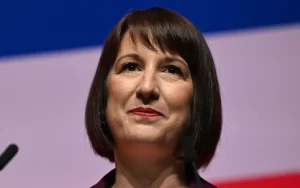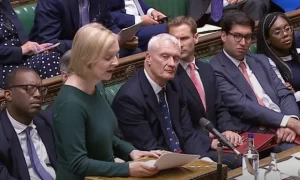New prime minister has honoured her pre-election pledge and announced a package of measures as cost of living soars
Help for consumers
Liz Truss has promised freeze energy bills at an average of £2,500 a year for the next two years from 1 October under the “energy price guarantee”, replacing the existing Ofgem energy price cap which was due to reach £3,549 from 1 October. The freeze includes the temporary removal of green levies on household bills, worth about £150.
The government said the measure will save the average household about £1,000 a year and is in addition to the £400 of support for all households announced by the former chancellor Rishi Sunak earlier this year.
Households who do not pay directly for mains gas and electricity such as those living in park homes, using heating oil or on heat networks will not be worse off and said they would receive personal support through a separate fund.
Help for businesses
Businesses and public sector organisations will be offered a new-six month scheme offering “equivalent support” with limited detail, which is expected to be an intervention to subsidise the wholesale price of gas. A review will take place in three months’ time to consider whether the scheme should become more targeted.
New oil, gas and fracking licences
A new oil and gas licensing round will be launched as early as next week, expected to lead to more than 100 new licences.
There will be a lift on the moratorium on the production of UK shale gas production. “This will enable developers to seek planning permission where there is local support, which could get gas flowing in as soon as six months,” the government said.
The government has decided to publish the British Geological Survey’s report into fracking, which was commissioned by the then business secretary, Kwasi Kwarteng, earlier this year. The study suggests “more drilling is required to establish data on shale resources and seismic impacts”, effectively reopening the door to an industry that has been under a moratorium since 2019.
The government hopes to “continue progressing” in its mission to generate 24 gigawatts of power from nuclear by 2050. A dedicated body, Great British Nuclear, has been set up to attempt to achieve this aim.
Truss also announced a review of the government’s net zero strategy, under the “altered economic landscape”. The review is likely to raise alarm bells from environmental campaigners, but will be chaired by Chris Skidmore, who chairs the Net Zero Support Group of Conservative MPs and is a key proponent of meeting the targets.
Help for suppliers
The Treasury will work with the Bank of England to “address the extraordinary liquidity requirements faced by energy firms operating in UK wholesale gas and electricity markets”. The energy markets financing scheme, designed as a “last resort”, is designed to “enable stability to both energy and financial markets, and reduce costs for businesses and consumers. It will open “by the end of October or sooner”. Energy companies have sought to secure their balance sheets amid fears they will have to buy their energy in advance in volatile wholesale markets.
Reforms to the structure and regulation of the energy markets are expected to be undertaken after a review of regulations.
Funding the support
The government will fund the scheme to reduce the unit cost of energy via increased borrowing, likely to exceed £100bn. However, Whitehall sources said estimates for the cost of the scheme will not come until the chancellor’s fiscal statement later this month.
Truss said a new windfall tax on energy firms “would discourage the very investment we need to secure home grown energy supplies”.
Reducing wholesale prices
An energy supply taskforce, led by Madelaine McTernan who led the UK’s Covid vaccine taskforce, has begun negotiations with “domestic and international suppliers” to agree contracts that reduce the price they charge for energy.
The taskforce will also negotiate with electricity generators – including wind, solar and nuclear power producers, some of whom have seen windfall gains from the rise in wholesale gas prices – to reduce the prices they charge. The talks follow proposals for a scheme where producers on renewable obligation contracts are encouraged to switch to contracts for difference.
This is why we have today sent a letter to the Prime Minister outlining a proposed five-point plan to help SMEs through the immediate energy crisis and to support the development of a low carbon economy. Our plan can be fully funded by a one-off emergency windfall tax on the major energy firms, which saw an unprecedented £170 billion in excess profit from skyrocketing energy prices.
Within our proposed plan, we are calling on the government to launch an urgent nationwide awareness campaign for SMEs and the public on energy efficiency and net zero deployed on a similar scale as that used for Covid-19 awareness. This will ensure it reaches every business in the country, uniting the nation in the drive for carbon reduction and greater energy efficiency, which will directly help SMEs reduce their energy bills, trade through this crisis and keep Britain’s economy moving.”
Adding her comments on the announcement Julia Usher, Managing Director of Burton-on-Trent-based Ashes Memorial Jewellery: said “This is a promising start to help with the torrid economic climate we are currently in. It will help households across the UK and also small businesses. However, this on its own is only a start and cannot be the whole package. The VAT rate needs to addressed with immediate effect to help both the consumer and all UK businesses. The PM needs to look to reduce it to 15%. We are about to head into the retail sector’s most import financial quarter. Christmas this year has never been more vital. Retailers need to secure good sales this festive season to ensure their survival amidst the protracted recession we now face.”
David Robinson, chartered wealth manager at London-based Wildcat Law added: “Short-term policies seem to be the tactic of this ‘new’ government. The much expected suspension of the Green Levy is a prime example of this. The money raised was used for a number of policies aimed at making the poorest homes in the UK more energy-efficient, thus benefiting people over the long term. Instead, the Government look like they are happy to mortgage the future for a gain that is unlikely to be as significant as the Levy. Make no mistake, the biggest beneficiaries of this will be the energy companies and their shareholders. Something needed to be done to ensure we did not have the spectre of thousands of households going through winter without heating but after having months to come up with a plan this appears to have been a Baldrick special. We are getting many of the negative sides of nationalisation without any of the potential benefits.”
Read more:
Liz Truss’s energy bailout: Key points to help consumers and UK business























